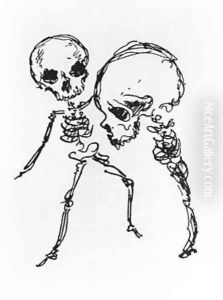Jules Laforgue Paintings
Jules Laforgue was a significant figure in the Symbolist movement, a literary and artistic movement that sought to represent absolute truths indirectly through symbols and metaphors. Born on August 16, 1860, in Montevideo, Uruguay, Laforgue was a French poet known for his ironic and innovative verse, which significantly influenced modernist poetry. Despite his brief life, he left an indelible mark on the world of literature.
Laforgue's family returned to France when he was quite young, and he spent most of his life there. He received a classical education, which later influenced his work, intertwining classical references with a modern, cynical wit. His career took a pivotal turn when he became a reader for Empress Augusta of Germany in 1881, a position that allowed him to be exposed to German literature and philosophy, notably the works of Arthur Schopenhauer and Eduard von Hartmann. These experiences deeply influenced his poetic vision, infusing it with a sense of pessimism and existential questioning.
Laforgue's poetry is characterized by its melancholic and often sardonic tone, exploring themes of ennui, existential despair, and the absurdity of life. His most famous collections include 'Les Complaintes' (1885), a series of satirical lamentations on various themes, and 'L'Imitation de Notre-Dame la Lune' (1886), which reflects his interest in the dichotomy between the spiritual and the carnal. Laforgue was also a pioneer in the use of free verse and is noted for his attempts to capture the rhythms of speech in his poetry, a technique that would heavily influence later poets.
Despite his contributions to poetry, Laforgue's work was not widely recognized during his lifetime. He struggled with health issues and lived in relative poverty. Laforgue married Leah Lee, an Englishwoman, in 1886, and the couple moved to Paris. However, his health continued to decline, and he died of tuberculosis on August 20, 1887, at the age of 27. It was only posthumously that Laforgue's influence on literary modernism was fully acknowledged, with his innovative use of language and form inspiring poets such as T.S. Eliot and Ezra Pound. Today, Jules Laforgue is celebrated as a forerunner of modernist poetry and a key figure in the Symbolist movement, remembered for his unique voice and his contribution to the evolution of poetic expression.

